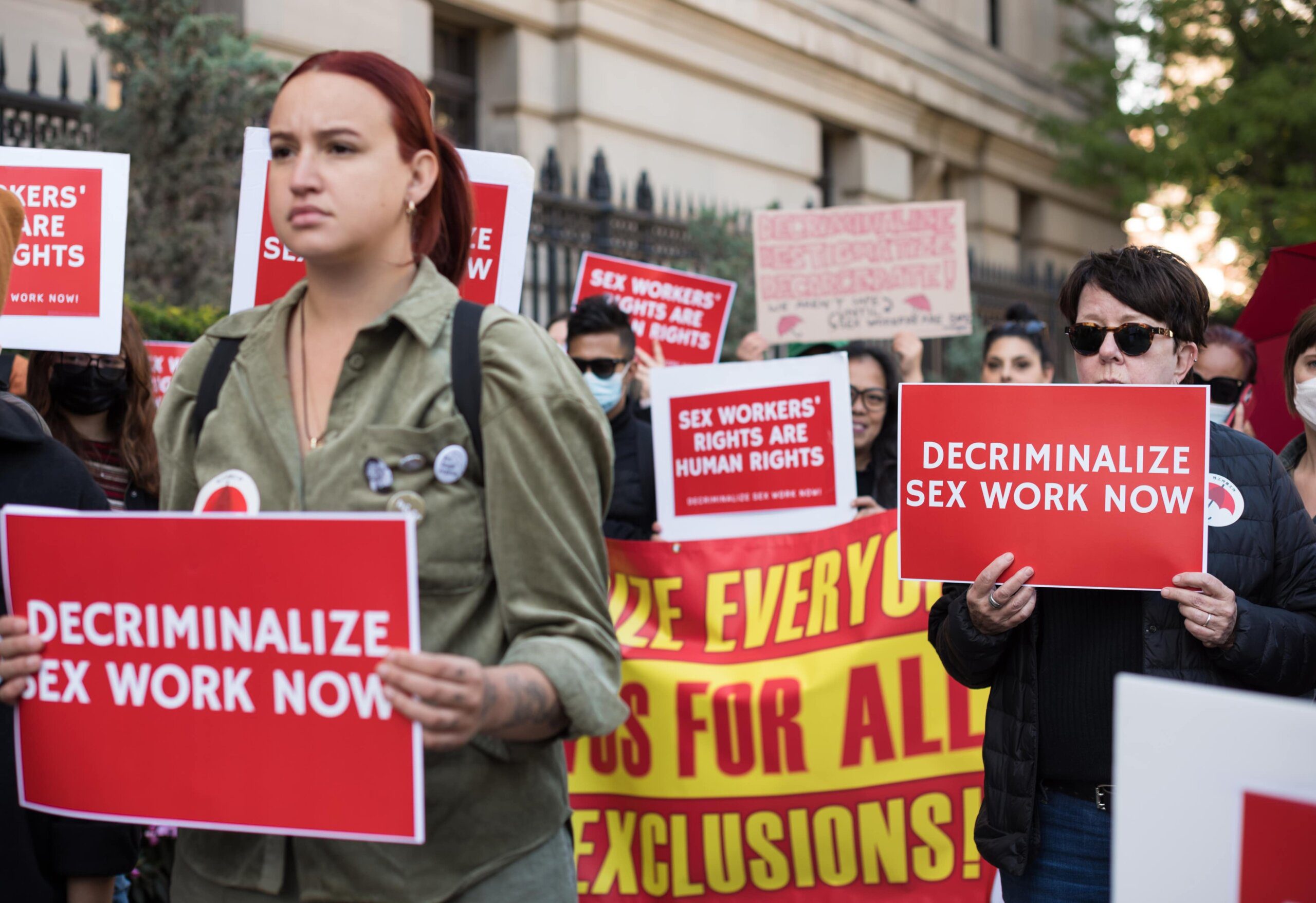The movement to reform sex work laws in Canada took a blow this week after Ontario’s Superior Court upheld the constitutionality of the Criminal Code provisions surrounding sex work.
The verdict released Monday was in response to a constitutional challenge launched in 2021 by the Canadian Alliance for Sex Work Law Reform (CASWLR), which is made up of 25 groups from across the country that support and provide services for sex workers. The constitutional challenge argued that Canada’s laws around sex work infringe on sex workers’ Charter rights to bodily autonomy, equality, safety and security, as they increase stigma, prevent sex workers from discussing consent with a client and invite targeted arrest and violence.
Justice Robert Goldstein dismissed the challenge, writing in a 142-page decision that the current laws “minimally impair the Charter rights of sex workers.” His findings claim that the legal framework balances the protection of sex workers from legal prosecution and the prohibition of “the most exploitative aspects of the sex trade.”
“We are deeply disappointed with the decision,” says Jenn Clamen, coordinator of CASWLR. “It’s very insulting and dismissive and invisiblizing, not just toward the realities that sex workers experience every day, but of the evidence that was actually submitted to the case.”
What was most insulting in the verdict, Clamen says, was the assertion that the sex workers who testified in the case do not understand how the laws that govern the trade function.
“You wonder if the court even read the evidence or listened to the evidence, because really the decision is just a regurgitation of all of the Crown arguments, including those that suggest that sex workers don’t know our own realities.”
The coalition is also concerned by Justice Goldstein’s inclusion of his finding that there is no “constitutional right to engage in sex work,” when their constitutional challenge was not arguing for such a right.
“The case we put forward was about a constitutional right to bodily autonomy, to equality, to safety and to security. It was really disingenuous to raise that discussion at the beginning of the decision as if the legal arguments in any way suggested that’s what we were seeking,” Clamen says.
The “Nordic model” of sex work legislation
When Canada’s Parliament passed amendments to the Criminal Code modifying the laws related to sex work in 2014, the political discourse was focused on how these changes would help protect sex workers and sex-trafficking victims from exploitation and criminalization.
The Protection of Communities and Exploited Persons Act (PCEPA) made purchasing sexual services illegal, as well as communicating or advertising the sale of sex and living off the profits of selling sexual services. A third party working to assist someone in selling sexual services is also committing a crime under the Criminal Code.
Actually selling sex, however, is not a criminal act in Canada’s current legal framework. This is known as the “Nordic model” of sex work legislation, which seeks to approach sex work as a form of exploitation rather than as a social ill, as it was previously seen to be.
But the ink hadn’t dried before groups supporting sex workers were challenging the supposed benefits of these laws, which are silent on the act of selling, but criminalize everything and everyone around it, from the people who purchase it to the landlords of sex workers who receive payments with money made from the sale of sex.
“Sex workers cannot legally actually do sex work anywhere. This idea that sex workers are immune from prosecution is just part of the PR packaging that the Conservative government sold to the public with PCEPA,” says Clamen.
In criminalizing the communication and advertising of sex work, it is effectively illegal to discuss terms and limitations with a client prior to selling, placing sex workers at greater risk of violence, CASWLR argued in court.
Clamen notes that Black and migrant sex workers in particular gave testimony in the case of their experiences of being criminalized under third-party laws when acting to protect the safety and security of other sex workers, such as by renting rooms for each other, scheduling clients for each other or renting space to each other.
“That’s how people build community, that’s how people work together, particularly in a criminalized context,” she says.
Racialized, trans sex workers at higher risk
CASWLR member group ASTT(e)Q, Action Santé Travesti(e)s & Transsexuel(le)s du Québec, a Montreal-based organization by and for trans people, which serves many sex workers, decried the ruling, which they say perpetuates a status quo of the criminalization of sex work and increases the risk of violence toward sex workers.
“Every day in our work we see how anti-trans narratives work in tandem with anti-sex narratives to push our people further into isolation and into precarity, and further into violent circumstances,” says Calvin Lachance, the coordinator of ASTT(e)Q.
“When we think about the migrant trans sex workers that we serve, in particular, the criminal provisions create this totally untenable life of risk and harm.”
The current laws make access to housing precarious, as sex workers can be evicted if their landlord discovers how they make their income, say both Lachance and Clamen. For migrant and undocumented sex workers, criminalization impacts their legal status and could spell deportation.
“The laws not only permit but embolden police to stop and harass and to arrest racialized, Black, migrant, trans sex workers, all of whom are already disproportionately targeted on the basis of their race and gender,” says Lachance.
Lachance notes that sex workers are routinely surveilled by police, and that he feels the ruling places greater weight on law enforcement’s testimony than the testimony of sex workers themselves about their working conditions.
“It can never be stated enough the extent to which the police feel emboldened to stop, harass, arrest, on any basis,” he says. “Even if they can’t arrest them on the actual basis of selling sex, they can arrest them on the basis of the web of criminality that surrounds what is presently in the Criminal Code.”
What happens now?
When CASWLR launched its constitutional challenge, the goal was to get all the way up to the Supreme Court of Canada. Clamen says that is still the group’s intention.
“Our fight is not over. We’re in discussion about what those next steps look like.”
Meanwhile, she is concerned about the message this ruling sends to the public, and to sex workers themselves.
“This decision most definitely sent a message to sex workers that sex workers don’t matter, that what sex workers are saying about the law isn’t true, that sex workers’ experiences aren’t valid,” she says.
“It’s one thing to say that the justice disagrees that the laws cause harm, it’s another thing to say that sex workers don’t understand what they’re saying.”
Clamen says this decision sends a message to the public that sex workers do not have the capacity to make decisions for themselves about their working conditions. Most of all, she says, the ruling perpetuates the notion that violence is part and parcel of sex work.
“The decision states that violence is a ‘key feature’ of sex work, which suggests that it’s intended to be understood that way,” explains Clamen. “And when you send that message to sex workers and you send that message to the public, you invite people to violate sex workers. It’s saying sex workers expect to be violated.”
Clamen invites the public to stand in solidarity and allyship with sex workers at this time.
“It’s a really important moment to listen to what sex workers are saying. The fact that we’re still trying to get that very basic foundation is ridiculous.”


 Why you can trust Xtra
Why you can trust Xtra


